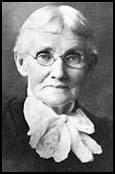Mary Bickerdyke

Mary Ann Ball was born in Know County, Ohio, on 19th July, 1817. A farmers daughter, she married Robert Bickerdyke in 1847. Bickerdyke had three children before her husband died in 1859.
On the outbreak of the American Civil War Bickerdyke joined a field hospital at Fort Donelson and worked on the first hospital boat that collected wounded soldiers from Cairo, St. Louis and Louisville.
Bickerdyke later became chief of nursing under the command of General Ulysses S. Grant. Bickerdyke served at Vicksburg and at the request of General William T. Sherman, accompanied the Union Army throughout the Atlanta Campaign.
After the war Bickerdyke worked with the Salvation Army in San Francisco in a project to help civil war veterans. Mary Ann Bickerdyke, who received a special pension from Congress in 1886, retired to Bunker Hill, Kansas, where she died on 8th November, 1901.
Primary Sources
(1) In her book, My Story of the War, Mary Livermore described the work of Mary Ann Bickerdyke on the hospital boat
After the battle of Donelson, Mother Bickerdyke went from Cairo in the first hospital boat, and assisted in the removal of the wounded to Cairo, St. Louis and Louisville, and in nursing those too badly wounded to be moved. On the way to the battlefield, she systematized matters perfectly. The beds were ready for the occupants, tea, coffee, soup and gruel, milk punch, and ice water were prepared in large quantities, under her supervision, and sometimes her own hand.
When the wounded were brought on board, mangled almost out of human shape; the frozen ground from which they had been cut adhering to them; chilled with the intense cold in which some had lain for twenty-four hours; faint with loss of blood, physical agony, and lack of nourishment; racked with a terrible five-mile ride over frozen roads, in ambulances, in common Tennessee farm wagons, without springs; burning with fever; raving in delirium, or in the faintness of death, Mother Bickerdyke's boat was in readiness for them.
(2) After the war a surgeon working with Mary Ann Bickerdyke wrote about her achievements working on the Union Army hospital ship.
I never saw anybody like her. There was really nothing for us surgeons to do but dress wounds and administer medicines. She drew out clean shirts or drawers from some corner, whenever they were needed. Nourishment was ready for every man as soon as he was brought on board. Everyone was sponged from blood and frozen mire of the battlefield, as far as his condition allowed. His blood-stiffened, and sometimes horribly filthy uniform, was exchanged for soft and clean hospital garments. Incessant cries of "Mother! Mother! Mother!" rang through the boat, in every note of beseeching and anguish. And to every man she turned with a heavenly tenderness, as if he were indeed her son.
(3) Mary Livermore, My Story of the War (1887)
At last it was believed that all the wounded had been removed from the field, and the relief parties discontinued their work. Looking from his tent at midnight, "Blind Jack" Logan, then a colonel, observed a faint light flitting hither and thither on the abandoned battlefield, and, and after puzzling over it for some time, decided it was someone robbing the dead. He sent his orderly to bring the rascal in. It was Mother Bickerdyke, with a lantern, groping among the dead. Stopping down, and turning their cold faces toward her, she scrutinized them searchingly, uneasy lest some might be left to die uncared for. She couldn't rest while she thought any were overlooked who were yet living.

